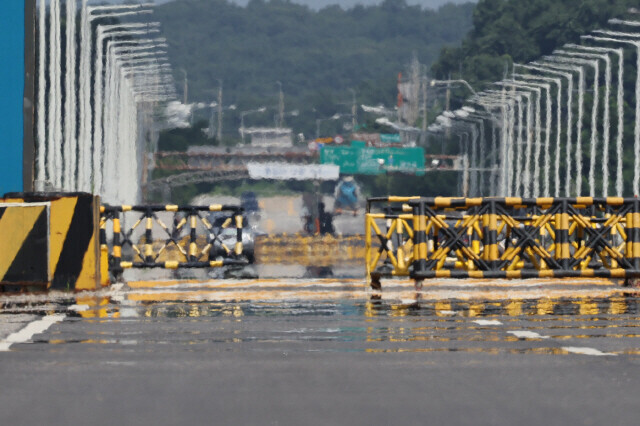hankyoreh
Links to other country sites 다른 나라 사이트 링크
It’s not the heat, it’s the humidity: Why the sauna-like weather hitting Korea is dangerous

Sweltering temperatures and sauna-like humidity has blanketed Korea in what experts call a “moist heat wave” this past week.
Not only does high humidity increase the body’s temperature, but it also makes it harder for sweat to evaporate. With the body’s process for cooling down impeded, people become more susceptible to heat-related illnesses, such as heat stroke.
To prevent heat-related illnesses, the Korea Disease Control and Prevention Agency (KDCA) recommends limiting activity during times of the day when the heat is high and drinking enough water at regular intervals so as to not feel parched.
On Tuesday, the Korea Meteorological Administration (KMA) forecast that high temperatures and humidity will continue for the foreseeable future, stating that most parts of the country would experience daily highs of around 35 degrees Celsius, or 95 degrees Fahrenheit.
The heat index soared to 34.4 degrees in Seoul at midday on Tuesday, while the mercury hit 33.9 degrees and humidity was up to 60%.
The humidity around the country at the same time reached 64% in Incheon, 68% in Paju, 66% in Gangwon, 66% in Cheorwon, 56% in Daejeon, and 57% in Busan.
“Normally, the midday humidity rate in South Korea is 40% to 50%, and it is usually higher in the summer,” said Woo Jin-gyu, an official at the KMA. “But recently, the numbers have soared due to a larger amount of water vapor, as the North Pacific high-pressure system that covers Korea has a humid nature, and the No. 6 Typhoon, Kanun, which is moving northwest, is bringing up water vapor.”
The World Meteorological Organization divides heat waves into “moist heat waves,” where both temperature and humidity are high, and “dry heat waves,” where it is dry and there is high solar radiation.
In a paper published in 2022 in the international journal Climate and Atmospheric Science, a research team led by Ha Kyung-ja, a professor of atmospheric sciences at Pusan National University, defined dry heat waves as having relative humidity below 33%, while moist heat waves have a relative humidity above 66%.
According to the paper, the Korean Peninsula is a region that frequently experiences moist heat waves. In particular, the heat stress index for humans was found to be higher in moist heat waves than in dry heat waves.
Such moist heat waves are predicted to occur more frequently and last longer in the future.
“As the sea surface temperature rises, more water vapor is released from the sea, so moist heat waves may occur more frequently in countries like South Korea, which are surrounded by water,” Ha told the Hankyoreh in a phone call.
Medical professionals believe that moist heat waves may be more harmful to health than dry heat waves. Heat is removed from the body by evaporation of sweat, but high humidity can impede this process.
“Heat is lost in the process of vaporization through sweating, but when it is humid, this process does not work well. This means it can be more difficult to control body temperature than when it is dry,” said Park Min-seon, a professor of family medicine at Seoul National University Hospital. “High humidity rates also make it difficult to breathe, which increases the likelihood of heat-related illnesses.”
Meanwhile, according to the results of the KDCA’s heat-related illness surveillance system made up of 504 medical institutions, there were 1,191 cases of heat-related illness and 13 deaths between May 20 and July 31.
In particular, 76.9%, or 10, of the deaths were concentrated in the three days from July 28-30.
By Kim Yoon-ju, staff reporter
Please direct questions or comments to [english@hani.co.kr]

Editorial・opinion
![[Column] The miscalculations that started the Korean War mustn’t be repeated [Column] The miscalculations that started the Korean War mustn’t be repeated](https://flexible.img.hani.co.kr/flexible/normal/500/300/imgdb/original/2024/0630/9717197068967684.jpg) [Column] The miscalculations that started the Korean War mustn’t be repeated
[Column] The miscalculations that started the Korean War mustn’t be repeated![[Correspondent’s column] China-Europe relations tested once more by EV war [Correspondent’s column] China-Europe relations tested once more by EV war](https://flexible.img.hani.co.kr/flexible/normal/500/300/imgdb/original/2024/0628/7617195640940814.jpg) [Correspondent’s column] China-Europe relations tested once more by EV war
[Correspondent’s column] China-Europe relations tested once more by EV war- [Correspondent’s column] Who really created the new ‘axis of evil’?
- [Editorial] Exploiting foreign domestic workers won’t solve Korea’s birth rate problem
- [Column] Kim and Putin’s new world order
- [Editorial] Workplace hazards can be prevented — why weren’t they this time?
- [Editorial] Seoul failed to use diplomacy with Moscow — now it’s resorting to threats
- [Column] Balloons, drones, wiretapping… Yongsan’s got it all!
- [Editorial] It’s time for us all to rethink our approach to North Korea
- [Column] Why empty gestures matter more than ever
Most viewed articles
- 1Dreams of a better life brought them to Korea — then a tragic fire tore them apart
- 2[Column] The miscalculations that started the Korean War mustn’t be repeated
- 3Yoon echoed conspiracy theories about Itaewon disaster, former National Assembly speaker says
- 4[Reportage] On Yeonpyeong Island, residents fear military drills will snowball into war
- 5Son Heung-min’s father, brother accused of child abuse at football academy
- 6After 7 years, South Korea resumes live-fire drills on islands a stone’s throw from North
- 7S. Korea joins US, Japan for first multi-domain drills at a time of escalating tensions
- 8Movie depicting the story of Park Jong-cheol captivates audiences
- 9[Photo] K-pop: For everyone, everywhere
- 10Nuclear South Korea back up for debate as North cozies up to Russia